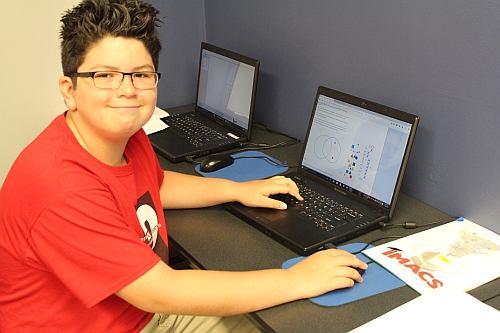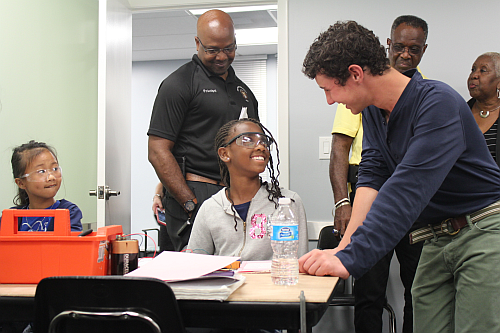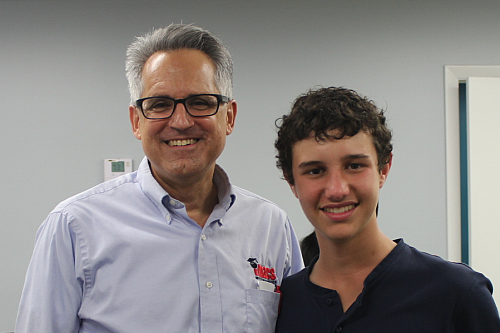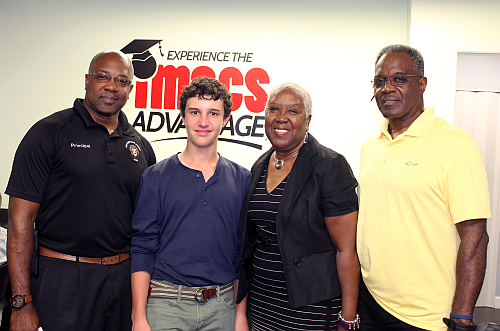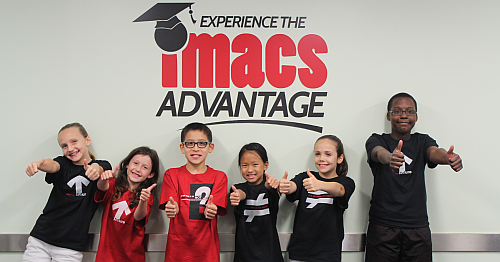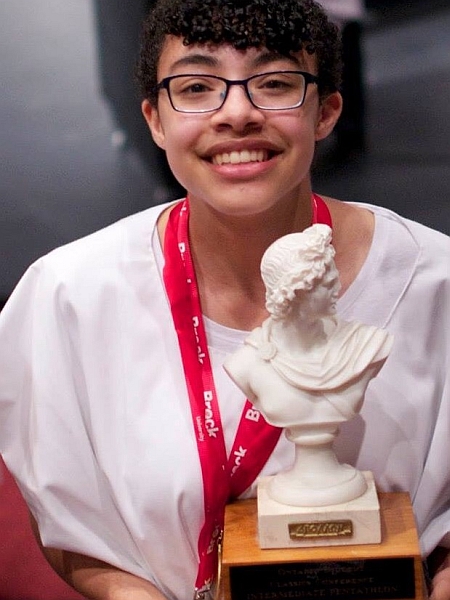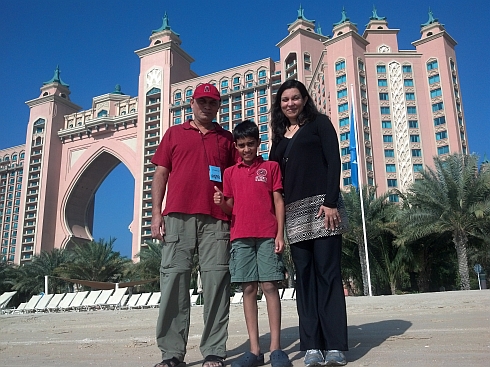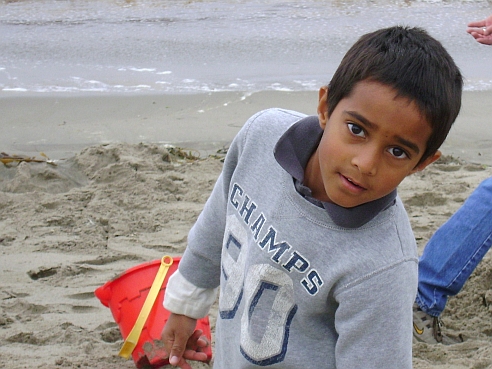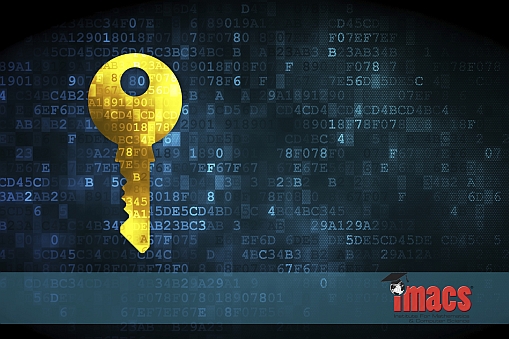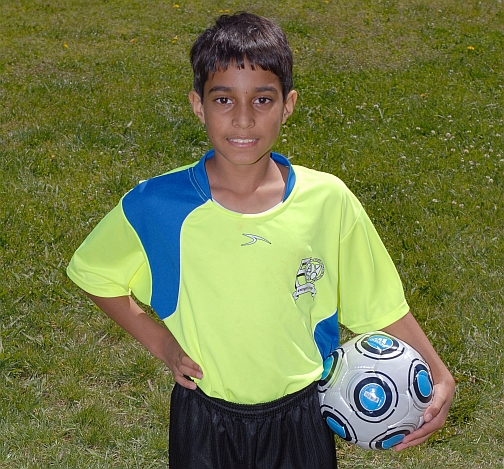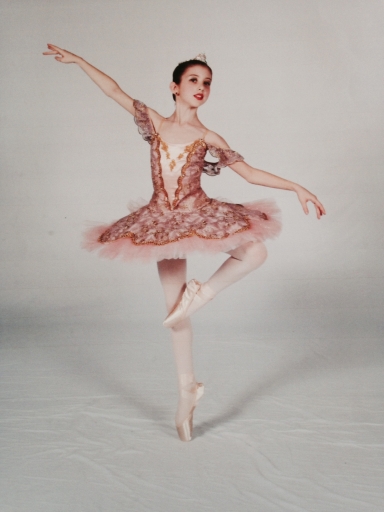
is excited about learning advanced mathematics.
Broward County Public Schools (BCPS) is increasing the number of middle school students enrolled in the Elements of Mathematics: Foundations (EMF) curriculum from 40 to several hundred students over the next several years. EMF was created for mathematically talented children by the Institute for Mathematics and Computer Science (IMACS), an independent teaching and educational research institute based in South Florida.
EMF is an online curriculum that teaches pre-algebra through pre-calculus plus several more advanced subjects in just three years. Graduates will be ready to study Advanced Placement calculus in ninth grade. The program also happens to cover Florida's math standards for sixth, seventh and eighth grades, which allows BCPS to offer EMF as a complete math curriculum for the District’s middle school students.
"BCPS wants our students to have the very best preparation in mathematical thinking and complex problem-solving," explains Guy Barmoha, Director of the Math, Science, and Gifted Department for BCPS. "The EMF pilot was a success, and the self-study, online format makes it relatively easy to scale up, even for a large school district like ours." Schools and districts interested in using EMF should contact IMACS directly.
A survey of current BCPS/EMF parents found the following:
- 100% of respondents said that their child's focus, study skills, and ability to analyze complex problems have improved since beginning EMF.
- 92% believe that EMF has made their child more ready for high school and college mathematics.
- 92% report that their child enjoys doing EMF and finds EMF challenging.
Nearly 90% of last year's BCPS/EMF class of sixth graders elected to continue in seventh grade. Wendy Diaz, whose son will continue, has seen EMF ignite a passion for learning within him: "Corbin comes home excited to see what is next in EMF. He absolutely wants to excel at everything now that he has seen how much fun it can be to learn."
More than 70 incoming sixth graders hope to qualify for the program this fall. Matt and Amy Kaufman, whose daughter Olivia will continue in the program, understand why: "EMF provides an avenue for children to stretch themselves mathematically. The feeling of accomplishment our daughter has received bolstered her confidence and has her ready for whatever comes her way."
With EMF, talented children can study college-level math such as Number Theory, Abstract Algebra and Probability & Statistics. "EMF teaches very advanced mathematical concepts, yet the presentation and problem sets are designed in a way that allows middle school kids to learn the material online," noted Maxim Chekmasov, who holds a Ph.D. in mathematics and whose son Andrei is in the program.
"BCPS has done an admirable job with its current gifted math program," said IMACS president Terry Kaufman. "Still, there are some kids who need an even greater challenge. I appreciate the trust that the BCPS has put in IMACS to provide a world-class education for its students and am thrilled that many more will benefit from EMF in the coming years."
About IMACS
The Institute for Mathematics and Computer Science (IMACS) is an independent teaching and educational research institute with centers in South Florida, North Carolina, St. Louis, and Connecticut. Over 4,500 students from across the US and around the world attend local IMACS classes or study its online courses. For more information, visit imacs.org or elementsofmathematics.com.
About Broward County Public Schools
Broward County Public Schools (BCPS) is the sixth largest public school system in the United States and the second largest in the state of Florida. BCPS is Florida's first fully accredited school system since 1962. BCPS has over 265,000 students and approximately 175,000 adult students in 238 schools, centers and technical colleges, and 103 charter schools. BCPS serves a diverse student population. Students are from 208 different countries and speak 181 different languages. For more information about BCPS, visit browardschools.com.
he is helping to sponsor at IMACS Hi-Tech Summer Camp.
The Institute For Mathematics and Computer Science (IMACS) has received a grant of $5,000 from the Multiplied Foundation Fund of the Community Foundation of Broward to provide full scholarships worth over $10,000 for 20 students to enroll in IMACS' 2016 Hi-Tech Summer Camp.
The Multiplied Foundation was founded by 14-year old IMACS student, Peyton Robertson, with the mission of supporting and expanding STEM (science, technology, engineering and math) education. Peyton has a deep appreciation for how early exposure to enriching STEM activities can motivate a young person. At 11 years old, he won the Discovery Education 3M Young Scientist Challenge. By 14, he was awarded three patents.
Peyton credits his academic accomplishments, in part, to the strong foundation in mathematical thinking that he developed while attending IMACS: "The early skills I developed at IMACS helped me to have a deeper understanding of the math and computer science classes that I have taken in school. My hope is that other students will benefit from the foundation that the IMACS program can provide."
"IMACS is honored to be working with the Multiplied Foundation to provide scholarships to 20 very deserving students," said IMACS President Terry Kaufman. "Bright and curious minds come from all backgrounds, and we all need to do more to identify and nurture these kids. We thank the Community Foundation of Broward for making this opportunity possible."
Camp scholarships were awarded to rising 4th through 9th graders who have a desire to build their math and logical reasoning abilities but who would otherwise not have the resources to attend. Recipients were selected from applicants at Piney Grove Boys Academy (PGBA) in Lauderdale Lakes and "I Have A Dream" Foundation in Miami.
Programming & Virtual Robotics class at IMACS.
James Wilson III, a rising 5th grader at PGBA, is excited to attend the camp. "Every day we get to do a cool project and learn something new. I can't wait for tomorrow," exclaimed James. "It's great to see my son, who is very athletic and into sports, also be so intrigued and interested in technology thanks to his time with the program," observed James's mother, Melissa Mata. "The exposure he's getting at IMACS is definitely priceless."
for providing this opportunity for their students.
Frances Bolden, Educational Administrator at PGBA, is also impressed with IMACS: "I could tell from meeting the staff and touring the facilities that IMACS is about challenging students through the latest technology to expand their knowledge to a new level." She added, "Everyone gave us a warm welcome, and I left knowing that our students were in good hands."
IMACS Hi-Tech Summer Camp program consists of logic puzzles, computer programming, virtual robotics, electronics, and an element of competition. Working solo and in teams, kids learn how to think logically and creatively while having fun.
About the Multiplied Foundation
The Multiplied Foundation's mission is to support and expand STEM (science, technology, engineering, and math) education. The Multiplied Foundation was founded by Peyton Robertson and seeded with the $100,000 he won during the 2015 Pebble Beach Pro Am's Chip Off Challenge. Each year, the Multiplied Foundation distributes 5% of its 12 quarter rated average value to organizations supporting STEM education. For more information, visit multipliedfoundation.org.
About IMACS
The Institute For Mathematics and Computer Science is an independent teaching and educational research institute focused on helping students reach their highest potential in math, computer science and logical reasoning. For more information, visit imacs.org.
About the Community Foundation of Broward
Founded in 1984, Community Foundation of Broward helps families, individuals, and corporations create personalized charitable Funds that deliver game-changing philanthropic impact. We provide leadership on community solutions, and foster philanthropy that connects people who care with causes that matter. Our 450 charitable Funds represent $173 million in assets and have distributed $89 million to create positive change. For Good. For Ever. For more information about Community Foundation of Broward, visit cfbroward.org or call
954.761.9503. Connect at #cfbroward @cfbroward
—Keith Devlin, Professor of Mathematics, Stanford University
Several of our Math Enrichment parents have asked why IMACS wasn’t mentioned in The Atlantic’s recent article entitled "The Math Revolution". Well, we’re the first to admit that we’re not sexy! To journalists, that is. Or rather what we do isn’t sexy, especially when compared to the panache of producing math competition winners. But we believe in what we do, which is more than just math. IMACS prepares children to be better thinkers for life. And after twenty-three years of seeing our approach succeed, we wouldn’t change for all the media coverage in the world.
For readers unfamiliar with IMACS, we specialize in mathematics and computer science for bright, talented and gifted K-12 students. The core of our program is our Mathematics Enrichment curriculum for elementary school students, which is taught at 29 locations throughout the US. IMACS Math Enrichment is unique in that it is intentionally designed to be completely different from school math. One might say it’s "mathematician" math because it teaches even our youngest students about beautiful and powerful mathematical structures studied by professional mathematicians and typically not introduced until college.
Why do we take this approach instead of starting with what kids have already seen and expanding on it? (It sure would be a lot easier on us to market curriculum that parents recognize and that journalists think they can write about!) This goes back to the overarching purpose of everything we do — making better thinkers for life. We’re not just about turning good math students into even better ones, although we do that. We’re not just about providing gifted students with an outlet for their creative mathematical thinking, although we do that a lot. We’re not just about teaching problem-solving skills, although we certainly do that. IMACS is about teaching children how to think in creative, logical and flexible ways that will benefit them throughout their lives, whether within or outside the mathematical arena. We equip them so that, long after they have left our classrooms and entered into the "real world", they will be able to react intelligently and constructively to problems and situations that no one alive today has even imagined.
How do you learn to face those kinds of novel situations? Not by working on problems that look familiar. As IMACS alumnus Zachary Kaufman put it, "Graduate school at Stanford was so much easier with the logical thinking skills I learned at IMACS. While classmates tried to memorize each type of problem, I was able to strongly grasp core concepts and use them to solve any problem, even if it was different from those I had seen." Zachary is a better thinker for life. Or alumna Rachel Cuozzo: "An MIT degree says to the world that you are capable of complex problem solving and abstract thinking. IMACS gave me a jumpstart on my MIT education, as it taught me to exercise the same parts of my mind that I use now on a daily basis." Rachel is a better thinker for life. This is what IMACS is about. Unfortunately, it doesn’t always make good copy in an article about math whizzes.
Furthermore, IMACS has never been only for kids who already excel at math or families seeking a challenging math education for their gifted children. Of course, the majority of our students are very mathematically talented, and they happily attend our Math Enrichment classes or take our online math courses. But IMACS also nurtures bright students with untapped abilities whose prior negative experiences turned them away from math. Usually, they have been misled into thinking that being good at math means calculating quickly, scoring high on standardized math tests, or enjoying math competitions. For many talented students, none of those apply. IMACS is able to take those kids — who often have natural talent for math expressed in other ways, such as a love for games, puzzles and patterns — and show them (1) what it means to be genuinely good at math and (2) how incredibly good at math they truly are. IMACS makes them, too, better thinkers for life.
So if you are a current IMACS parent wondering if you’re missing out on something, or if you are a prospective parent considering IMACS, we encourage you to confirm that the math enrichment providers you are considering actually live up to their claims. Some will tell you that they go beyond what schools do. Some will tell you that they don’t do "drill and kill". Verify for yourself. Ask to observe a class and to see samples of the curriculum. Does it look familiar? Is it largely similar to what schools already teach? That will tell you a lot about whether your child’s mind is going to be expanded as much and in ways that you’re hoping for and quite possibly paying for.
as she holds the trophy for winning the Intermediate Pentathlon prize
at this year’s Ontario Student Classics Conference.
This week, the IMACS Blog visits with eIMACS student Shuli Jones. Shuli is one of our star students, having excelled in our university-level computer science courses since the 6th grade. She recently attained the highest score possible on the AP Computer Science A test exam as a high school freshman. A multitalented young lady with a passion for programming, Shuli is well on her way to a bright future.
Please tell our readers a little bit about yourself and what you enjoy doing.
My name is Shuli Jones. I’m fifteen years old, and I’m currently a sophomore in high school. In my spare time, I like to participate in a variety of activities: I love to read, I do archery recreationally, I’m part of a trivia team and a classics society at my school, and, of course, I love programming. I’m also interested in learning new languages, coding and otherwise!
You’ve done some amazing things already at a young age. Tell us about the accomplishments and experiences of which you are most proud.
In recent memory, the thing I am the most proud of is scoring a 5 on the AP Computer Science A test. I took it while still a freshman, so it was my first AP test and I was very nervous beforehand. However, eIMACS had prepared me unbelievably well, and that, combined with my own hard studying, meant the test was nowhere near as hard as I expected. When the results came in, both my parents and I were really pleased.
Something else I’m proud of is my performance in my school’s classics society. Every year in May, we participate in the Ontario Student Classics Conference. This is a three-day competition with numerous other schools that tests knowledge of Latin grammar and vocabulary, as well as Roman life, mythology, and history. For me, this was my biggest commitment during the school year, and it’s something that I love to do. I put in many, many hours of hard work studying and working on projects with my team members, and it paid off.
My team won the Phyllis Morgan Trophy for Overall Excellence, which is typically regarded as the "top" trophy at the conference. I won several individual awards in the Intermediate category (for those having taken two years of Latin): First in Pentathlon, for having the best overall score on the five main events (notably with a first in Latin Derivatives), and first in Latin Oral Reading. I was also part of a group of four students who came second in Quaerite Summa ("Reach for the Top"), which is a quiz-bowl style competition based solely on Roman life. It felt great to get recognition for my work on something I love so much.
How did you become interested in computer science?
When I was in sixth grade, I spent Spring Break at a Girls Learning Code camp. They had partnered with eIMACS to give away a scholarship for the first eIMACS programming course, University Computer Science I. To apply for the scholarship, I took the eIMACS Aptitude Test. The test was interesting and challenging, so my parents said they would sign me up for the course. From there, my interest only increased. I’ve taken three eIMACS courses now, and each one has introduced me to new programming languages, topics, and ideas.
What do you enjoy most about the eIMACS computer science courses?
I have to say, the thing that appeals to me the most about these courses is their rigor. I can tell a lot of care was put into creating them: the information is always laid out in a logical sequence, and the learning curve is perfect. Assignments are usually just the right difficulty level to leave me challenged but not frustrated. At the same time, the programming that I’m learning is very in-depth; I feel that I’m being prepared very well to succeed in the rest of the coding world. I especially liked the variety of languages that eIMACS introduced me to (Scheme, Haskell, Python and Java), as well as the focus on "good" programming and not just on getting things done.
What are some ways in which your eIMACS experience has had a positive effect on your academic and non-academic pursuits?
Completely thanks to the knowledge I gained from my eIMACS courses, this past summer I was offered my very first paid programming internship. It was a great opportunity to learn more about the outside world of programming (and the endless debugging that real coders must carry out!). The courses I’ve taken through eIMACS have also greatly increased my capacity for logical analysis and thought; I often find myself applying the programming principles I’ve learned to my schoolwork and assignments. Additionally, eIMACS has had a positive effect on my life overall. I’ve been participating in their courses for three years now, and they have broadened my mind and introduced me to new things I might never have experienced otherwise. I’m so happy that I chose to learn computer science through eIMACS.
What kinds of things do you see yourself doing in the future?
I’m not sure yet. I know that I want to work in a STEM field, and right now my thinking is that I’d like to do something with engineering — perhaps be a mechanical engineer? I want my job to be something that lets me create new things and leave my mark on the world. Whatever that may be, I know eIMACS has helped to prepare me by giving me a solid grounding in programming and logical thought.
"My kid could finish his math homework in no time if he would just do it, but instead he drags it out for an hour, and that’s with me having to nudge him through it." Sound familiar? Parents and teachers often assume that a gifted child will automatically be a high achiever given the child’s high abilities, so it comes as a surprise when he or she underachieves. There can be a variety of reasons for underachievement, but a common cause is lack of motivation. Whereas bright students often enjoy working toward external recognition for their accomplishments, gifted learners may not value outside praise as much, particularly if given for activities that do not enhance their learning experience. A child may think, "I already know it, so why should I have to spend time proving that to someone else, especially someone who knows that I know it?"
Parents and teachers searching for ways to reignite motivation in an underachiever would do well to appeal to his or her intrinsic love of genuine learning. Because gifted children typically require little effort to learn standard curricula, they need additional challenges that demand meaningful effort. The satisfaction that talented athletes feel after bearing the weight of a true physical challenge fuels their fire to push to the next level. Talented minds need to feel that same kind of satisfaction, the kind that comes from bearing challenges that have true intellectual weight, so they can make the connection between effort and achievement. Providing those challenges is a first step to bringing back lost motivation. For additional strategies on enhancing motivation in gifted children, visit the Davidson Institute for Talent Development.
the magnificent Atlantis Hotel on a family trip to Dubai.
When fewer than 1% of 2014 college-bound high school seniors attain a perfect 800 on the math section of the SAT, you know that you’ve met someone special when he’s achieved that amazing feat before even cracking the teen years. That someone is Shiva Oswal, a precocious 11-year-old from Northern California who recently earned that lofty score as part of a program through Johns Hopkins’ Center for Talented Youth (CTY) called the Julian C. Stanley Study of Exceptional Talent (SET). In fact, the probability of an 11-year-old earning a perfect score is less than 0.01%!
According to its website, SET "was created to help extremely talented students achieve their full potential, and, through its research and advocacy initiatives, to enhance the educational opportunities available for all academically advanced students." Those who qualify through their SAT scores gain access to individualized educational counseling and opportunities to connect with mentors and intellectual peers.
How did Shiva do it? The multi-talented board game designer and aspiring professional soccer player mostly studied on his own by taking SAT practice tests. He kept acing the math section at home, so he felt confident that he had done equally well on the real thing, and indeed, he had. (By the way, Shiva is happy with his performance on the Critical Reading and Writing sections too!) His parents, Arvinder and Vikas, are extremely proud, but they also realize the magnitude of the journey known as raising Shiva.
The Moment You Know Your Child is Gifted
When Shiva was around two years old, his parents noticed that he was able to master abstract concepts and make many logical connections. He often saw patterns and anomalies that others overlooked. For example, having observed that cars had license plates with letters and numbers, he was quick to notice a car with an all-numeric license plate and proceeded to ask numerous questions to understand why. The same thing happened when later that week he saw a car with just letters on its license plate.
As with many gifted children, Shiva enjoys probing a subject thoroughly and persistently asks questions in an attempt to acquire deeper knowledge. "How fast can a cheetah run?" "What will happen if it fights an elephant?" "Is a cheetah faster than Spiderman?" These are just some of the questions that his mother, Arvinder, remembers from a time when two-year-old Shiva was intensely passionate about the swift, spotted feline.
By age four, Shiva was solving math problems in his head. When his preschool teacher asked the class how many hundreds make a million, Shiva promptly responded with the correct answer, 10,000, even though he had never been exposed to the concept of multiplication. At that point, Arvinder and Vikas, were certain that their son was gifted. "We felt a sense of responsibility and were quite unprepared to deal with the needs of a relentlessly curious and intensely gifted child," recalls his mother.
From School to Homeschool
As residents of the Silicon Valley area, the Oswals have access to some of the best schools, public or private, in the United States. During the first few weeks of kindergarten, Shiva was very excited to go to school and usually sat in the front row, eager to learn. Over time, the limited intellectual stimulation led to a decline in his interest in school. By the end of second grade, Shiva frequently announced that lunch and recess were about the only things he looked forward to at school. This is when his parents knew that they needed to look for alternatives.
"While schools did the best they could, they were neither adequately prepared nor widely exposed to what it takes to meet the needs of the gifted child and hence lacked the ecosystem to adequately challenge the gifted mind," explains Arvinder. After a few months of intense reflection and research, they concluded that homeschooling would probably best suit Shiva.
One of the key benefits of homeschooling is the ability to customize an education specific to a child’s passions. Of course, homeschooling has hurdles too. As Shiva’s mom describes, "The primary challenge is that most of the research (to design an optimal experience) rests on the shoulders of parents because designing a sufficiently challenging and engaging learning experience requires an intimate knowledge of the individual child’s passions and strengths."
Resources for Gifted Students
Meeting the educational needs of an extremely bright but young person such as Shiva is no easy task. For his parents, the main difficulty is to continuously find resources of increasing complexity and to pursue these without extinguishing the love of learning. Balance and a sense of what truly matters in life act as guiding principles. "Our hope is that Shiva lives a joyful and fulfilling life while pursuing his passions to the fullest, and we hope he is minimally affected by extraneous factors such as the pursuit of wealth, fame or approbation."
The Oswals have found that the most relevant resources for Shiva have been either online or in classes with small groups of passionate, gifted kids with shared interests.
"Self-paced, online programs such as Elements of Mathematics: Foundations from IMACS are uniquely suited to adequately challenge the mathematically gifted," shares Arvinder. "Our son loves EMF as it allows him to accelerate at his own pace and level up accordingly."
Other online programs that have worked for Shiva include Guinevere’s Gifted Group also known as Online G3. G3 classes are grouped by skill level rather than chronological age to allow asynchronous learners to accelerate as needed. Shiva also loves the Druidawn creative writing program, which taps into "the multidimensional and kaleidoscopic world that resides within the gifted mind."
Live Resources and Events
In addition to online courses, Shiva has benefited from small, live (or live streamed) classes. He loves attending classes taught by Dr. Lucian Sega who encourages gifted students to engage in sustained, rigorous mathematical pursuits. As Vikas and Arvinder explain, "Dr. Sega’s ability to make a broad range of advanced, often abstract mathematical concepts crystal clear is stunning. We find ourselves wishing we could travel back in time to restart our own secondary math education with him!"
For introducing a wide range of math concepts in an engaging way, the Oswals are grateful to Yul Inn of the Fun Math Club. Another extraordinary educator and entertainer who has taught the Oswals much is Dr. Arthur Benjamin. "Our family has enjoyed his Mathemagics shows numerous times. Each time we’ve watched him in action, we gained a new insight, a heightened love for learning or both!"
Other Important Resources
Additional resources can be found through support organizations such as Gifted Homeschoolers Forum, the Davidson Institute for Talent Development, Hoagies’ Gifted Education Page, the TAGMAX listserv and the National Association for Gifted Children.
The Journey
The responsibility of nurturing a young, gifted child takes heartfelt dedication and constant work to continually build an ever-evolving system of resources and support. It is, without a doubt, a labor of love as only a parent can know it, both the wonderful strides and the worrisome stress. But it is all part of a unique path that each family with a child like Shiva must forge together.
As Shiva’s mom put it beautifully, "An important part of what we do has to do with ‘the journey’. The journey has not been delegated. The fondest part is that we are traveling on this journey together. We are constantly amazed at how far a child can go when allowed to freely pursue a passion-centric learning approach. It’s been a joy to see Shiva surprise us every day with out-of-the-box solutions. We are very grateful for all that we are learning together as a family because we often satisfy curiosities rather than march to fulfill an external mandate or to earn a grade."
Editor’s Note: Shiva’s parents granted IMACS permission to disclose his status as a Davidson Young Scholar and as a participant in the CTY SET program.
The Institute for Mathematics and Computer Science (IMACS) recently released its first online algebra course, Algebra: Groups, Rings and Fields. This is the tenth course in the Elements of Mathematics: Foundations (EMF) program for talented secondary school students. Our latest self-paced offering has generated a fair amount of inquiries from parents seeking options for their mathematically advanced child. The answers to some of those questions can be found in the FAQ at EMFmath.com. IMACS responds to others, which have been consolidated by topic, in this week’s blog post.
Q: My child aced pre-algebra and is ready for algebra. Why can’t I just enroll her in the first EMF algebra course?
When people use the term “algebra,” they’re usually talking about high school algebra or what mathematicians call “elementary algebra.” By contrast, EMF teaches the kind of algebra that a mathematics major at university learns called “abstract algebra.” A student who has mastered pre-algebra is, no doubt, ready for high school algebra. However, this same student, no matter how talented, is simply not ready to jump directly into abstract algebra.
Why? Just as success in high school algebra is built on the foundation laid by elementary school math up through pre-algebra, success in abstract algebra requires a strong foundation in various mathematical structures and reasoning techniques that are rarely taught outside of a university setting. This important foundation is built up through the first nine courses of the EMF program. In fact, one might think of these early courses as constituting “pre-abstract algebra.” As such, they are an integral part of the EMF program and essential to success in the later courses.
In case you’re wondering, students who complete the EMF algebra courses will have learned all of elementary algebra and be able to solve any high school algebra problem with ease. But they will also have learned a great deal more and be well-prepared to study the high-level mathematics that is at the heart of important disciplines such as particle physics and cryptography.
Q: What if my child already took high school algebra and geometry? Is there anything left for him to learn in EMF?
As IMACS principal founder and EMF co-author, Burt Kaufman, once wrote, “It is surely a sad state of affairs that in the traditional high school curricula, the student encounters very few, if any, mathematical ideas that postdate the seventeenth century. … It would be ludicrous if an English curriculum for the high school never contemplated confronting the student with a piece of literature written after Shakespeare.”* That’s one key reason why the EMF curriculum was created—to teach modern mathematics to talented, young students who are capable of benefiting from advanced material that goes beyond the outdated math curricula used in schools.
Naturally, more experienced students will find some of the EMF material familiar, but EMF approaches these topics from a far more sophisticated standpoint. Between the new mathematical structures and techniques for reasoned argument that they will be learning, there is much for these students to gain in EMF if they are motivated to learn real mathematics as opposed to just school math.
Q: We tried other math programs for advanced kids, but they just seemed to be about going faster or preparing for competitions. That’s not working for our son who’s more of a deep thinker. I’ve heard that EMF takes a different approach. Can you explain?
First, a pair of quotes:
—Jim Simons, Mathematician and Founder of Renaissance Technologies
—Jo Boaler, Professor of Mathematics Education, Stanford University
The competition-inspired approach to math has its merits. But it’s hardly the only approach worthy of mathematically talented kids. The gifted population is filled with individuals who have exceptional talent and prefer to take their time. EMF is an ideal option for these students because the program is self-paced and encourages patience in coming to a deeper understanding of complex and beautiful ideas. At the same time, we’ve had numerous EMF students who also enjoy and excel at competition math. In fact, in situations where speed is of the essence, the non-standard mathematics to which EMF students are exposed gives them a distinct advantage over others who are seeing these ideas for the first time during a competition.

EMF algebra students will have a head start in the mathematics of particle physics.
Q: You say that EMF is “mathematician math,” and that it’s taught the way a math major at university would be taught. That’s nice, but what are the benefits for a talented child who has no interest in being a math major, let alone a mathematician?
Before your child writes off being a math major completely, especially if that choice is based on experiences with school math, consider the following:
—Keith Devlin, Professor of Mathematics, Stanford University
Whether your child decides to pursue a math major or not, there are several important skills that the EMF approach to mathematics teaches. As with all IMACS programs, EMF fosters the development of logical reasoning skills in young students. While some people believe that logic is cold and inhibits creativity (think: Star Trek’s Spock!), our experience teaching the EMF curriculum over the past 30+ years suggests otherwise. To the contrary, we have found that when IMACS students are equipped with the logic skills to construct their own well-reasoned arguments and critique those of others, the clarity of thought that this produces unleashes creative and innovative ideas that were previously unfocused or muddled.
Which brings us to how EMF encourages creative thinking. As Professor Devlin reminds us, mathematics is a creative discipline. The fact that what passes as “math” in schools is devoid of creativity should not be taken as evidence that true mathematics is indifferent to creative thinking. School math tends to take a “tell-then-drill” approach where the teacher states a rule and then students apply the rule to umpteen haphazard problem sets. By contrast, EMF uses carefully constructed exercises and interactive technology to guide students to their own “discovery” of mathematical results. To be successful in EMF, a student simply must think creatively in order to cross the bridge from keen mathematical observations to the “A-ha!” moments of intuitive understanding. And when these moments happen, the joy and pride of having climbed the intellectual mountain are profound.
Another skill that EMF promotes is abstract thinking. Imagine a world in which most jobs involve people interacting with tangible objects in the present. Perhaps you envisioned the Industrial Revolution, a time when mechanical inventions led to an explosion in manufacturing. Today, we find ourselves amidst a Knowledge Revolution wherein technological inventions mean that well-paying jobs require abstract thinking about intangible ideas such as code. This is obviously true in tech, but because tech touches every industry now, it’s also true for wide-ranging fields from medicine to music to law to film. It’s the question on many people’s minds: Are you going to design and program the robot, or will you be replaced by the robot? Whatever career your child pursues, he or she will almost certainly need to think abstractly. Abstract thinking is fundamental to the study of genuine mathematics, which is what EMF teaches.
Is EMF right for your child? IMACS created a 30-minute, online Aptitude Test to help prospective parents and students answer this question. Register to take the FREE test at EMFmath.com.
* Kaufman, Burt, Jack Fitzgerald, and Jim Harpel. MEGSSS in Action. St. Louis: CEMREL, Inc., 1981.
This month’s IMACS Blog features Shiva Oswal, one of the top performers in our Elements of Mathematics: Foundations (EMF) self-paced, online program for talented secondary school students. Shiva has been enrolled in EMF since the beginning when IMACS introduced the first course of the series in late 2012. As his mom told us, “[O]ur son is an avid user of online educational resources. I recently asked him to pick his favorite online course. He answered, ‘most definitely EMF, by a wide margin’.”
Please tell our readers a little bit about yourself and what you enjoy doing.
I’ll be turning 11 soon, and I love the EMF courses! As a history buff, I really enjoy reading about decisive battles in world history. I also like playing board games and computer games. Right now my favorite board game is Robo Rally, and my favorite computer game is Castle Empire. On the weekends, I participate in Live Action Role-Playing (LARP) events. Soccer is another activity I enjoy. My favorite position is goalie.
You’ve done some amazing things already at a young age. Tell us about the accomplishments of which you are most proud.
This year, I scored 24 out of 25 to earn a gold pin in the Mathematical Olympiads for Elementary and Middle Schools (MOEMS), and was named MOEMS “Mathlete of the Year” for my geographic region. I also invented a new board game called “Minetrap”. I am currently working on publishing my game. If you would like updates, email me at shivarasul [at] gmail [dot] com. Finally, I completed the first seven EMF courses and am almost finished with the eighth course. I am excited to start the ninth course, Number Theory soon.
How did you become interested in mathematics?
When I was in preschool, I was doing multiplication. When math in regular school became too easy, I decided to homeschool so I could work on challenging math problems and concepts.
How did you become interested in taking EMF courses?
My mom encouraged me to try the EMF courses, and I’ve been hooked ever since.
What are the things you enjoy most about EMF?
I like the way concepts are explained. The format of EMF courses, reading followed by exercises, helps check my understanding. The interactive tools such as The String Game make learning math fun. Also the point system (i.e., ability to level up based on mastery of material) makes EMF addictive.
What are some ways in which your EMF experience has had a positive effect on your academic and non-academic pursuits?
When I did my first EMF course, Operational Systems, I was very new to the field. I learned a great deal about operational systems and modular arithmetic after I completed this course. I have grown by leaps and bounds as an analytical thinker as EMF courses force me to think. The program has also helped me improve my skills at strategy games like chess.
What kinds of things do you see yourself doing in the future?
First and foremost, I would like to complete all 15 EMF courses. I hope to get to Calculus before I’m 13 years old. I am also working on becoming a professional soccer player.
Thank you, Shiva, for sharing your story and congratulations on your amazing accomplishments!
Discover why the Elements of Mathematics: Foundations program from IMACS is an excellent option for your mathematically talented middle-school-aged child.
Half Price Holiday Sale: Try the first course, Operational Systems, at 50% off the regular price when you enroll on or before December 20, 2014.
Bundled Savings: Save 25% on EMF Course Pack 9, which includes the first nine courses, when you enroll on or before December 20, 2014.
Once upon a time, there was a bright student who first came to IMACS when he was already in high school. He was interested in learning to program and had heard high praise for our University Computer Science courses. The class began smoothly as teacher and pupil progressed through the principles of computational thinking. This student, who was used to conquering schoolwork with his brain tied behind his back, slayed the early exercises with ease. As the assignments quickly became more challenging, however, he found himself unaccustomed to the effort of intellectual struggle. One day, our earnest student declared to his IMACS instructor that a certain programming problem was simply impossible to solve! Our wise and experienced teacher considered this student with a measured gaze and pointed out, “But you’ve only thought about it for three minutes.” The student, quite politely, seriously, and honestly replied, “Well, yeah.” If only he had started IMACS when he was younger. The moral of the story: The earlier the experience of true intellectual challenge, the stronger the will of the mind to persevere. (In other words, enroll your elementary school child in IMACS today!)
in the Fort Lauderdale Ballet Classique’s 40th Annual Nutcracker.
This month the IMACS Blog caught up with Azzara Nincevic, who has been a star student at IMACS for seven years now. Azzara enjoys reading, drawing, and classical ballet. Although she dances at least 12 hours per week and performs throughout the year, she always finds time for IMACS.
“When I began IMACS in first grade, I immediately loved it.” Azzara says. “Having taken an interest in math, I quickly learned the traditional material and was looking for more challenging enrichment. When I attended class at IMACS, all of the problems were thought-provoking.”
As a member of her school’s math team, Azzara attends competitions such as MATHCOUNTS and Mu Alpha Theta where her IMACS background has been an invaluable asset. As Azzara describes it, “The IMACS curriculum helped me to develop logical thinking skills and the ability to quickly solve math problems, which are key to succeeding at math competitions.”
“With the preparation that IMACS gave me, I was able to score a 5 on the AP® Computer Science exam as a seventh grader.”
While Azzara’s achievements in mathematics and ballet, by themselves, are enough to impress anyone, it’s her recent performance on the AP® Computer Science A exam that readers will recognize as a rare feat. Soon after starting IMACS Math Enrichment program, Azzara enrolled in our Computer Enrichment & Virtual Robotics class where she developed a great interest in programming. Over the years, she continued with IMACS University Computer Science (UCS) track, which culminates in our AP® Computer Science: Java Programming course.
AP® exams are typically administered to high school students, but at the time that Azzara was ready for APCS, she was only just entering seventh grade. That didn’t deter her. “After inquiring, my mom and I found out that there is no minimum age requirement for an AP® exam, so I registered. With the preparation that IMACS gave me, I was able to score a 5 on the AP® Computer Science exam as a seventh grader.”
With such a busy schedule, Azzara appreciates that one of the greatest benefits of IMACS is that the computer science and logic programs are accessible online and self-paced. “I was able to excel at my own pace and access the IMACS curriculum anytime and anywhere.”
What does the future hold for Azzara? “I am entering the eighth grade with a greater passion for and interest in math and computer science. IMACS made me realize that I would like to pursue computer science in college and after. The fundamental skills that I have learned in the UCS courses and the logical thinking skills I have learned in the Math Enrichment and Mathematical Logic courses give me the advantage I need to be successful. As such, I plan to continue with IMACS in the upcoming years.”
« Newer Posts — Older Posts »







